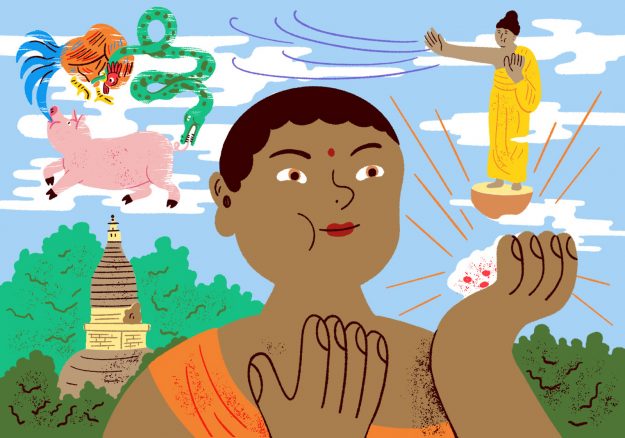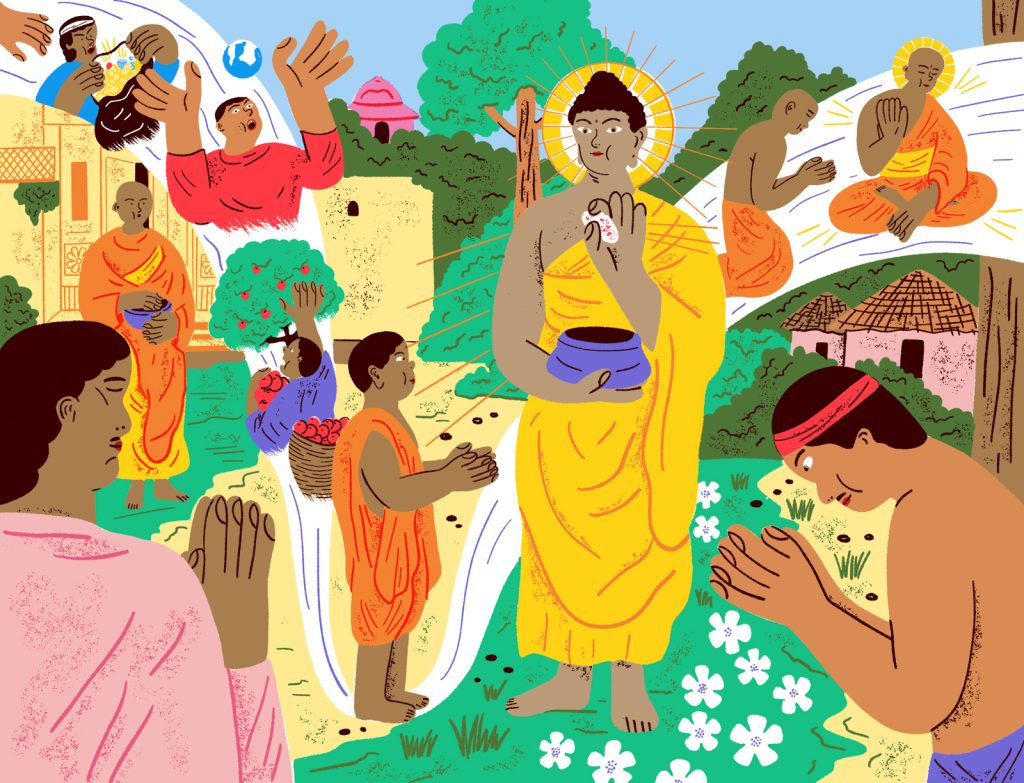“When the time arrives—even if
A hundred eons pass—
Fruit is born of every act
That sentient beings amass.”
—Karmashataka
Why is karma, one of the most central Buddhist concepts, so hard to wrap our minds around? It’s nearly impossible for most of us to avoid mistaking karma for a system of reward and retribution, in which we are punished for our “bad” behavior and compensated for the “good.” As Buddhists, even as we work toward kindness and compassion for all beings, we often easily wind up deflated and frustrated with ourselves. The guilt we feel imprisons us in inaction, and we are left struggling to change even small habits. How do we stop blaming ourselves for what happens to us and start feeling empowered to change it?
When we experience the power of wise action, we can truly understand our innate potential for self-determination. This capacity lives deep inside all of us but is obscured by our layers of confusion about how reality works. Understanding what karma is—and is not—lets us tap into that power that is always present. Then we can truly begin to change our lives. As we get a feel for karma as action, we can begin to connect our actual actions to their eventual results. Then we’ll start to understand how what we are doing now will dictate what our future will be like. In the classical texts, the discussion is framed not in terms of “good karma” or “bad karma” but rather of “virtuous (kushala)” and “non-virtuous (akushala)” deeds. These terms come from the Sanskrit texts that appear in translation in the Tibetan canon and are more closely tied to notions of benefit and harm than the ways we often talk about karma in everyday conversation. The texts tell us that these two types of actions naturally ripen into the fruits of our future lives and life experiences.
How do we stop blaming ourselves for what happens to us and start feeling empowered to change it?
The difference between this definition and our earlier misunderstanding of karma is that there is no third party passing judgment. There is simply a given action and its corresponding result. When we focus less on dodging imaginary punishments and more on planting seeds for the future with our beneficial thoughts and actions, we are on the right track.
How do we get there, though? Fortunately, one does not have to become a monastic or a Buddhist scholar to begin to understand how to apply karma to our lives. One genre of Buddhist literature consists of stories known as avadanas, narratives passed down orally over centuries as teaching tools. Scholars imagine they were used, for example, by monks and nuns in the homes of householders who were hosting the monastics for their midday meal. Avadanas are intended to inspire faith and devotion in the listener by providing lessons about the workings of karmic cause and effect. They are entertaining, often humorous, occasionally heartbreaking, and meant to be accessible to people who are working, tending to families, and otherwise living life out in the world—just like us.
In fact, in the majority of the stories householders are at the center of the events that take place. They feature a rich cast of characters including beings from all six realms of existence. There are businesspeople, couples trying to conceive, older adults, spellcasters, sex workers, women fleeing unhappy marriage arrangements, people with disabilities—no matter who you are, there is probably a story that features someone you can relate to as either the protagonist or a supporting character. There are talking animals, beautiful gods and demigods, fantastical hell beings, and anguished spirits, as well as luminary figures from the sangha of the Buddha’s disciples, both monks and nuns.
The Karmashataka, a sutra whose title means “A Hundred Deeds,” is a collection of over 120 avadanas. After nearly a decade of work, the translation organization 84000 has recently finished the first English version, which is now available online at read.84000.co. Each avadana tells a story that ends with the Buddha explaining what happened in terms of karma, laying out which of the characters’ past actions ripened into their current predicament or good fortune.
One such story in the Karmashataka is “Give It to Me,” a tale that takes its name from the demand of the unnamed brahmin boy who is its central character. The boy encounters the Buddha just as a householder places a laddu, a kind of sweet treat, into the Buddha’s begging bowl. Fixated on getting it, the boy addresses the Buddha by name, shouting, “Hey, Gautama!” and impulsively demands, “Gimme that laddu!”
The Buddha, ever generous, agrees, on one condition: “Child, if you say, ‘I don’t need that laddu,’ I’ll hand it over.” The boy repeats after him, “Hey, Gautama, I don’t need that laddu,” and the Buddha, true to his word, places the treat in the boy’s hand.

This exchange is witnessed by one of the Buddha’s disciples, a householder named Anathapindada. Aware that this is the only alms the Buddha will receive this day, he intervenes, fearing the Buddha will go hungry, and offers the boy five hundred gold coins to return the laddu to the Buddha. The boy consents and hands it back.
In a last passage that is typical of the Karmashataka stories, at this point the monks inquire of the Buddha why he insisted that the boy repeat “I don’t need that laddu” before giving the treat to him. The Buddha replies with the story’s karmic lesson:
“Monks,” explained the Blessed One, “for many thousands of lifetimes, that brahmin child frequently indulged, became addicted, and ended up wanting more. Thus I’ve lured him with a laddu treat to turn him away from his preoccupation with acquiring things; that will be the sole cause of his going forth, . . . cast[ing] away the afflictive emotions, and manifest[ ing] arhatship.”
As the Buddha explains here, the few words the boy said at his prompting will become the ultimate cause not only of the boy’s future ordination as a monk but also of his subsequent transcendence of desire, anger, and ignorance.
Out of his great compassion, the Buddha interrupts the pattern and introduces an opportunity for liberation.
In the boy’s impulsive demand the Buddha sees both a history and a future of addiction that threatens to continue as an unending cycle. Though it is not a punishment leveled by a third party, the endless obsessive craving of addiction is a prison that the boy does not recognize, much less know how to escape. To this predicament the Buddha brings compassion, not condemnation. At no point does the Buddha pass judgment on the boy’s character or his pattern of addiction. He simply recognizes it for what it is, a form of suffering and an obstacle to the boy’s development.
Out of his great compassion, the Buddha interrupts the pattern and introduces an opportunity for liberation. By encouraging the boy to repeat his words, the Buddha prompts a beneficial deed to break the cycle of addiction. This deed will ripen into the fruits of the boy’s rebirth as a monk, as well as into his higher spiritual achievements.
Conventional wisdom tells us that simple shifts of thought, when repeated over time, help bring about changes in well-worn habits. The Buddha’s wisdom goes vastly beyond this. He demonstrates that even an act as small as mouthing words by rote can lead us from our present state all the way to liberation. We can see this in our own spiritual practice. How many of us spent months, maybe even years, repeating the refuge prayer before we felt the truth of it in our hearts? At the beginning we logically recognized and accepted the value of taking refuge in the Buddha’s path. Yet it took time to steadily grow into a heartfelt, deeply held conviction. With repetition and reflection, eventually the words of the refuge prayer become suffused with precious meaning.
The Buddha’s teaching on karma in this story is meant to help us generate the great motivation needed to sustain us on our spiritual path. If we continue to minimize our positive efforts as insignificant because they seem small to us, then we miss the Buddha’s point entirely. The teachings on karma take us much further than most of us dare imagine, by suggesting that every action we take has the potential to change the course of our lives—in fact, our future lives.
This knowledge should inspire in us great optimism. We have the capacity within ourselves to bring about the things we want most: peace of mind, an open heart, and a limitless potential for helping ourselves and others. Like the refuge prayer that we at first repeat without fully understanding it, our nascent good deeds eventually become genuine movements of the heart and, one day, a way of life.
Thank you for subscribing to Tricycle! As a nonprofit, we depend on readers like you to keep Buddhist teachings and practices widely available.
